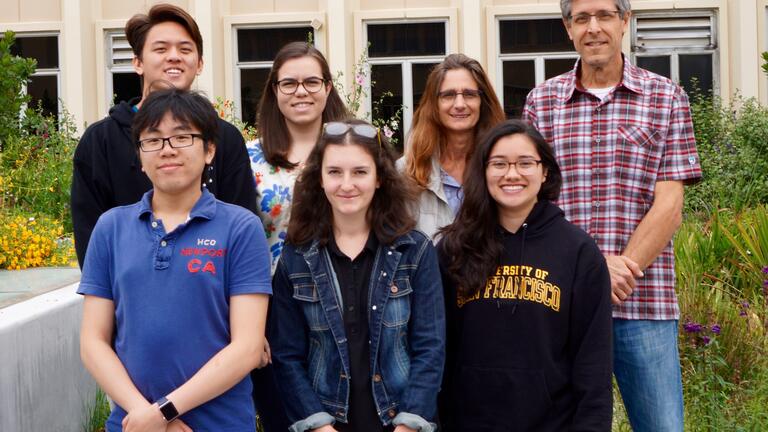Grant Funds Faculty-Undergrad Research Group For 3 More Years
A collaborative faculty-undergrad research program in USF’s Chemistry department has received a National Science Foundation research grant for $204,902. Disbursed over three years, this grant will fund summer research projects that will provide hands-on training to three undergraduates per year under the direct mentorship of the faculty members leading the research group, Profs. Claire Castro and William Karney.
Specifically, the upcoming summer research projects will focus on two topics: (1) the reactivity of polycyclic aromatic hydrocarbons (environmental pollutants) and (2) quantum mechanical tunneling in annulenes.
As a part of their contribution, students will learn to use state-of-the-art computational chemistry software to help elucidate the reaction pathways of carbon based compounds and perform calculations to obtain molecular geometries and energies that allow the research team to predict the most likely reaction pathway for a molecule.
Publish With Your Faculty
As a member of the Castro-Karney research group, students not only have the opportunity to do real research alongside full-time faculty members, but also to become published authors themselves.
Twenty-two past undergraduate student researchers have been listed as co-authors with Profs. Castro and Karney. This includes sixteen papers published in a variety of prestigious peer reviewed journals, including the Journal of the American Chemical Society, the Journal of Organic Chemistry, Organic Letters, and the Journal of Physical Organic Chemistry. In the past five years alone, these numbers include twelve different students on seven different papers.
The group hosts a comprehensive list of these publications on their website.
Equipped To Succeed
This is the fourth 3-year NSF grant the Castro-Karney research group has received, which means they have been offering collaborative summer research projects to undergraduates since their first NSF award in 2006. As a result, Castro and Karney have a lot of experience in cultivating future chemists.
“Fully funded summer research with faculty mentors is unusual,” Prof. Castro said. “A more common scenario is that students are mentored by masters- or PhD-level graduate students."
We feel our close mentoring skills, coupled with the projects we carry out, have resulted in the majority of our students continuing on a chemistry-related trajectory once they have graduated.
Of the thirty students Castro and Karney have mentored, sixteen have completed or are enrolled in a PhD program, three have earned masters degrees in science-related fields, two have received MDs with one more currently enrolled in an MD program, and three became directly employed by the chemical industry.
Interested in former student researchers and where they are now?
Cultivating Diversity
The grant also allows the Castro-Karney research group to continue to foster the participation of underrepresented groups in chemistry. Part of this is due to USF’s student body, the pool from which the group pulls its researchers, which is naturally diverse. According to U.S. News and World Reports, USF is consistently ranked in the top 20 of U.S. universities for student ethnic diversity.
However, as a collaborative research group, Profs. Castro and Karney also have a penchant for searching out these underrepresented groups in chemistry and inspiring them to participate in the research group.
For instance, half of the students in the research group since its inception have been women. While this is surely in part due to the fact that over 60 percent of USF students are women, it is also true that Prof. Castro is skilled at recruiting and helping to retain women undergraduate researchers.
Fully-Funded Means Well-Compensated
On top of bestowing the skills and experience necessary to give you a leg up on life after graduation, undergraduate members of the Castro-Karney research group are well compensated for their time and work. As a student researcher, you will be paid a stipend of about $4,000 for 9 weeks of work.
“It is more common for undergraduates to work for a much smaller stipend, such as $1,000-$2,000, or even for free,” Prof. Castro said.
Moreover, the grant also provides funding to send student researchers to regional and national meetings, including the annual American Chemical Society meeting, to present their results. In the past, students have traveled to ACS meetings in Denver, Boston, Chicago, Salt Lake City, Atlanta, and New Orleans, and regional meetings in Sacramento, Santa Clara, and Sonoma.
There is a comprehensive list of all of these student presentations on the group’s website.
